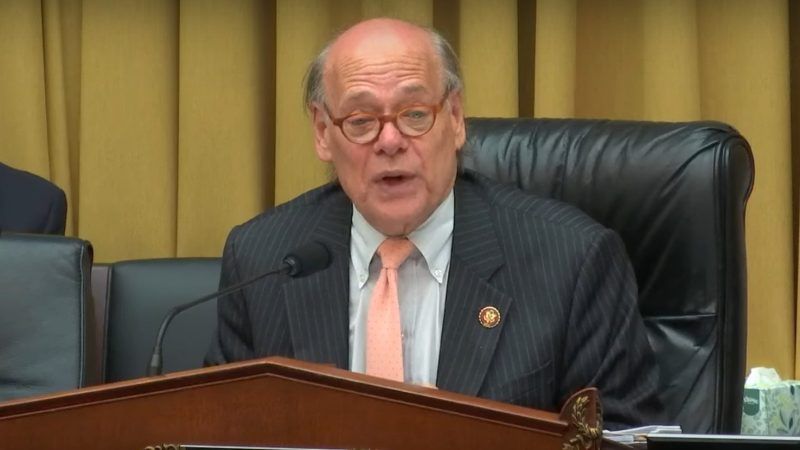'Historic' Congressional Hearing on Marijuana Legalization Highlights Strategic Differences
Should federal marijuana reform be tied to a broader "racial justice" agenda?

During a hearing that observers and participants called "historic," a House subcommittee yesterday considered how to resolve the conflict between federal marijuana prohibition and state laws that allow medical or recreational use of the drug. Although there was broad agreement about the need for reform, the hearing before the House Judiciary Committee's Subcommittee on Crime, Terrorism, and Homeland Security highlighted differences over strategy and rhetoric.
"Marijuana decriminalization may be one of the very few issues upon which bipartisan agreement can still be reached in this session," said Rep. Tom McClintock (R-Calif.). "It ought to be crystal clear to everyone that our laws have not accomplished their goals."
But Rep. Matt Gaetz (R-Fla.), a co-sponsor of the reform bill known as the Strengthening the Tenth Amendment Through Entrusting States (STATES) Act, questioned the wisdom of tying federal marijuana reform to the broader issue of "racial justice," as reflected in the title of the hearing ("Marijuana Laws in America: Racial Justice and the Need for Reform"), especially if it involves fiscal provisions aimed at compensating for the racially disproportionate impact of the war on weed. The Marijuana Justice Act that Sen. Cory Booker (D-N.J.) introduced in 2017, for instance, includes financial penalties for states that disproportionately arrest members of minority groups for marijuana offenses and a "Community Reinvestment Fund" that would spend $500 million a year.
"My deep concern is that concerns over how far to go on some of the restorative elements in our policy could divide our movement," Gaetz said. "If we further divide out the movement, then I fear that we'll continue to fall victim to that which has plagued other Congresses, where we don't get anything done."
One of the witnesses, Baltimore State's Attorney Marilyn Mosby, argued that "the restorative elements" are essential. "We need to reinvest in those individuals and those communities that have been disproportionately impacted," Mosby told the committee. "The STATES Act does not do that, and that's one of the reasons why I'm opposed to it."
While the roots of pot prohibition were indisputably racist and the burdens of that policy clearly fall more heavily on people with dark skin, I tend to agree that portraying marijuana reform as a "racial justice" issue, while it may appeal to left-leaning members of Congress, will tend to alienate potential Republican allies. Playing up the federalism angle, as the STATES Act conspicuously does, is more likely to attract the Republican support that Democrats will need to get legislation approved by both houses of Congress.
Another omission from the STATES Act is more troubling: It does not actually repeal the federal ban on marijuana. Instead of removing marijuana from Schedule I of the Controlled Substances Act—a category that is supposedly reserved for drugs with high abuse potential and no recognized medical applications that cannot be used safely even under a doctor's supervision—the bill says the CSA's marijuana provisions "shall not apply to any person acting in compliance with State law relating to the manufacture, production, possession, distribution, dispensation, administration, or delivery of marihuana."
Keeping marijuana in Schedule I while allowing exceptions for state-legal conduct leaves unresolved major problems created by the federal ban, including barriers to medical research and the highly burdensome tax provision that requires state-licensed cannabis suppliers to count business expenses as part of their income. It also might not fully address the reluctance of banks to serve businesses that sell a Schedule I drug.
"I've been working on this issue for 40 years, and it's just crazy that we don't just get it all done," said Rep. Steve Cohen (D-Tenn.). "I appreciate Mr. Gaetz's work on the issue—and I understand incremental[ism]—but after 40 years, it's time to just zap straight up, get it all done, Schedule I gone."
Disagreements aside, the bipartisan consensus about the failure of prohibition was striking. "I've long believed that the criminalization of marijuana has been a mistake, and the racially disparate enforcement of marijuana laws has only compounded this mistake," said House Judiciary Committee Chairman Jerrold Nadler (D-N.Y.) "Applying criminal penalties with their attendant collateral consequences for marijuana offenses is unjust and harmful to our society. The use of marijuana should be viewed instead as an issue of personal choice and public health."


Show Comments (31)